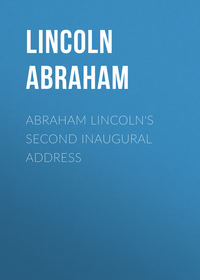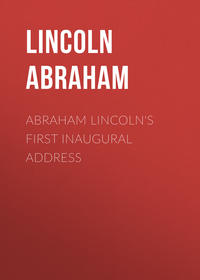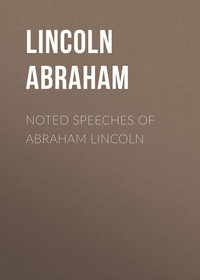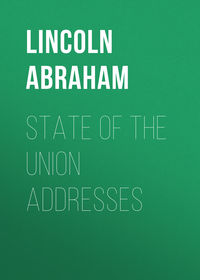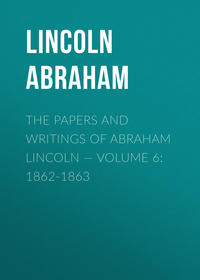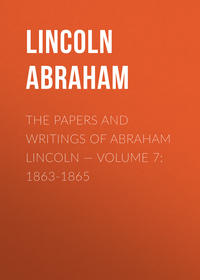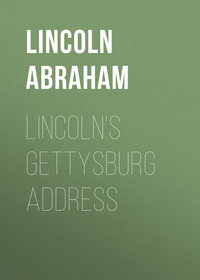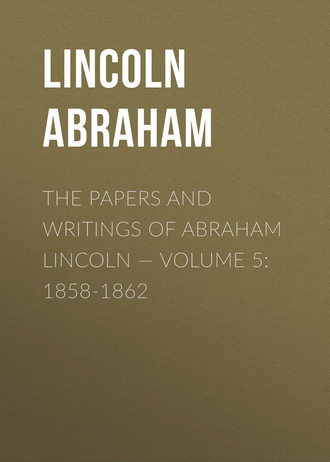 полная версия
полная версияThe Papers And Writings Of Abraham Lincoln — Volume 5: 1858-1862
A. LINCOLN.
EXECUTIVE ORDER NO. 2. — IN RELATION TO STATE PRISONERS
WAR DEPARTMENT, WASHINGTON CITY, FEBRUARY 27, 1862It is ordered:
First. That a special commission of two persons, one of military rank and the other in civil life, be appointed to examine the cases of the state prisoners remaining in the military custody of the United States, and to determine whether in view of the public Safety and the existing rebellion they should be discharged, or remain in military custody, or be remitted to the civil tribunals for trial.
Second. That Major-General John A. Dix, commanding in Baltimore, and the HON. Edwards Pierrepont, of New York, be, and they are hereby, appointed commissioners for the purpose above mentioned; and they are authorized to examine, hear, and determine the cases aforesaid ex parte and in a summary manner, at such times and places as in their discretion they may appoint, and make full report to the War Department.
By order of the President EDWIN M. STANTON, Secretary of War.
ORDER RELATING TO COMMERCIAL INTERCOURSE
Considering that the existing circumstances of the country allow a partial restoration of commercial intercourse between the inhabitants of those parts of the United States heretofore declared to be in insurrection and the citizens of the loyal States of the Union, and exercising the authority and discretion confided to me by the act of Congress, approved July 13, 1861, entitled "An act further to provide for the collection of duties on imports, and for other purposes," I hereby license and permit such commercial intercourse in all cases within the rules and regulations which have been or may be prescribed by the Secretary of the Treasury for conducting and carrying on the same on the inland waters and ways of the United States.
WASHINGTON, February 28, 1862.
A. LINCOLN.
SPEECH TO THE PERUVIAN MINISTER,
WASHINGTON, D. C., MARCH 4, 1862The United States have no enmities, animosities, or rivalries, and no interests which conflict with the welfare, safety, and rights or interests of any other nation. Their own prosperity, happiness, and aggrandizement are sought most safely and advantageously through the preservation not only of peace on their own part, but peace among all other nations. But while the United States are thus a friend to all other nations, they do not seek to conceal the fact that they cherish especial sentiments of friendship for, and sympathies with, those who, like themselves, have founded their institutions on the principle of the equal rights of men; and such nations being more prominently neighbors of the United States, the latter are co-operating with them in establishing civilization and culture on the American continent. Such being the general principles which govern the United States in their foreign relations, you may be assured, sir, that in all things this government will deal justly, frankly, and, if it be possible, even liberally with Peru, whose liberal sentiments toward us you have so kindly expressed.
MESSAGE TO CONGRESS RECOMMENDING COMPENSATED EMANCIPATION
March 6, 1862FELLOW-CITIZENS OF THE SENATE AND HOUSE OF REPRESENTATIVES: — I recommend the adoption of a joint resolution by your honorable bodies which shall be substantially as follows:
"Resolved, That the United States ought to co-operate with any State which may adopt gradual abolishment of slavery, giving to such State pecuniary aid, to be used by such State, in its discretion, to compensate for the inconveniences, public and private, produced by such change of system."
If the proposition contained in the resolution does not meet the approval of Congress and the country, there is the end; but if it does command such approval, I deem it of importance that the States and people immediately interested should be at once distinctly notified of the fact, so that they may begin to consider whether to accept or reject it. The Federal Government would find its highest interest in such a measure, as one of the most efficient means of self-preservation. The leaders of the existing insurrection entertain the hope that this government will ultimately be forced to acknowledge the independence of some part of the disaffected region, and that all the slave States north of such part will then say, "The Union for which we have struggled being already gone, we now choose to go with the Southern section." To deprive them of this hope substantially ends the rebellion, and the initiation of emancipation completely deprives them of it as to all the States initiating it. The point is not that all the States tolerating slavery would very soon, if at all, initiate emancipation; but that, while the offer is equally made to all, the more northern shall by such initiation make it certain to the more southern that in no event will the former ever join the latter in their proposed confederacy. I say "initiation" because, in my judgment, gradual and not sudden emancipation is better for all. In the mere financial or pecuniary view, any member of Congress with the census tables and treasury reports before him can readily see for himself how very soon the current expenditures of this war would purchase, at fair valuation, all the slaves in any named State. Such a proposition on the part of the General Government sets up no claim of a right by Federal authority to interfere with slavery within State limits, referring, as it does, the absolute control of the subject in each case to the State and its people immediately interested. It is proposed as a matter of perfectly free choice with them.
In the annual message last December, I thought fit to say, "The Union must be preserved, and hence all indispensable means must be employed." I said this not hastily, but deliberately. War has been made and continues to be an indispensable means to this end. A practical reacknowledgment of the national authority would render the war unnecessary, and it would at once cease. If, however, resistance continues, the war must also continue; and it is impossible to foresee all the incidents which may attend and all the ruin which may follow it. Such as may seem indispensable or may obviously promise great efficiency toward ending the struggle must and will come.
The proposition now made (though an offer only), I hope it may be esteemed no offense to ask whether the pecuniary consideration tendered would not be of more value to the States and private persons concerned than are the institution and property in it in the present aspect of affairs.
While it is true that the adoption of the proposed resolution would be merely initiatory, and not within itself a practical measure, it is recommended in the hope that it would soon lead to important practical results. In full view of my great responsibility to my God and to my country, I earnestly beg the attention of Congress and the people to the subject.
A. LINCOLN.
INDORSEMENT ON LETTER FROM GOVERNOR YATES
STATE OF ILLINOIS, EXECUTIVE DEPARTMENT, SPRINGFIELD, ILL., March 1, 1862HON. EDWIN M. STANTON, SECRETARY OF WAR, Washington, D. C.
SIR: — The government at my special request a few months since contracted for fourteen batteries of the James rifled gun, 6-pounder calibre, and a limited quantity of the James projectiles, weighing about fourteen pounds each. The reports showing the superiority of this gun and projectile, both as regards range, accuracy, and execution, for field service over that of all others at the battle of Fort Donelson, leads me to request that there be furnished to the State of Illinois in the shortest time practicable seven batteries of 12-pounder calibre James rifled guns, with carriages, harness, implements, etc., complete and ready for field service, together with the following fixed ammunition to each gun, viz., 225 shells, 225 canister, and 50 solid projectiles, weighing about 24 pounds each, and also 200 shells, 100 canister, and 100 solid projectiles for each of the guns of the fourteen batteries named above, weighing about 14 pounds each, all to be of the James model.
Very respectfully,
RICHARD YATES, Governor of Illinois.
[Indorsement.]
March 8, 1862.
The within is from the Governor of Illinois. I understand the seven additional batteries now sought are to be 6-gun batteries, and the object is to mix them with the fourteen batteries they already have so as to make each battery consist of four 6-pounders and two 12-pounders. I shall be very glad to have the requisition filled if it can be without detriment to the service.
A. LINCOLN.
PRESIDENT'S GENERAL WAR ORDER NO.2
EXECUTIVE MANSION, WASHINGTONMarch 8, 1862.
Ordered: 1. That the major-general commanding the Army of the Potomac proceed forthwith to organize that part of the said army destined to enter upon active operations (including the reserve, but excluding the troops to be left in the fortifications about Washington) into four army corps, to be commanded according to seniority of rank, as follows:
First Corps to consist of four divisions, and to be commanded by Major-General I. McDowell. Second Corps to consist of three divisions, and to be commanded by Brigadier-General E. V. Sumner. Third Corps to consist of three divisions, and to be commanded by Brigadier-General S. P. Heintzelman. Fourth Corps to consist of three divisions, and to be commanded by Brigadier-General E. D. Keyes.
2. That the divisions now commanded by the officers above assigned to the commands of army corps shall be embraced in and form part of their respective corps.
3. The forces left for the defense of Washington will be placed in command of Brigadier-General James S. Wadsworth, who shall also be military governor of the District of Columbia.
4. That this order be executed with such promptness and dispatch as not to delay the commencement of the operations already directed to be underwritten by the Army of the Potomac.
5. A fifth army corps, to be commanded by Major general N. P. Banks, will be formed from his own and General Shields's (late General Lander's) divisions.
A. LINCOLN.
PRESIDENT'S GENERAL WAR ORDER NO.3
EXECUTIVE MANSION, WASHINGTON, MARCH 8,1862Ordered: That no change of the base of operations of the Army of the Potomac shall be made without leaving in and about Washington such a force as in the opinion of the general-in-chief and the commanders of all the army corps shall leave said city entirely secure.
That no more than two army corps (about 50,000 troops) of said Army of the Potomac shall be moved en route for a new base of operations until the navigation of the Potomac from Washington to the Chesapeake Bay shall be freed from enemy's batteries and other obstructions, or until the President shall hereafter give express permission.
That any movements as aforesaid en route for a new base of operations which may be ordered by the general-in-chief, and which may be intended to move upon the Chesapeake Bay, shall begin to move upon the bay as early as the 18th day of March instant, and the general-in-chief shall be responsible that it so move as early as that day.
Ordered, That the army and navy co-operate in an immediate effort to capture the enemy's batteries upon the Potomac between Washington and the Chesapeake Bay.
A. LINCOLN
INTERVIEW BETWEEN THE PRESIDENT AND SOME BORDER SLAVE STATE
REPRESENTATIVES, BY HON. J. W. CRISFIELDMEMORANDUM
"DEAR SIR: — I called, at the request of the President, to ask you to come to the White House tomorrow morning, at nine o'clock, and bring such of your colleagues as are in town."
WASHINGTON, March 10, 1862.
Yesterday, on my return from church, I found Mr. Postmaster-General Blair in my room, writing the above note, which he immediately suspended, and verbally communicated the President's invitation, and stated that the President's purpose was to have some conversation with the delegations of Kentucky, Missouri, Maryland, Virginia, and Delaware, in explanation of his message of the 6th instant.
This morning these delegations, or such of them as were in town, assembled at the White House at the appointed time, and after some little delay were admitted to an audience. Mr. Leary and myself were the only members from Maryland present, and, I think, were the only members of the delegation at that time in the city. I know that Mr. Pearoe, of the Senate, and Messrs. Webster and Calvert, of the House, were absent.
After the usual salutations, and we were seated, the President said, in substance, that he had invited us to meet him to have some conversation with us in explanation of his message of the 6th; that since he had sent it in several of the gentlemen then present had visited him, but had avoided any allusion to the message, and he therefore inferred that the import of the message had been misunderstood, and was regarded as inimical to the interests we represented; and he had resolved he would talk with us, and disabuse our minds of that erroneous opinion.
The President then disclaimed any intent to injure the interests or wound the sensibilities of the slave States. On the contrary, his purpose was to protect the one and respect the other; that we were engaged in a terrible, wasting, and tedious war; immense armies were in the field, and must continue in the field as long as the war lasts; that these armies must, of necessity, be brought into contact with slaves in the States we represented and in other States as they advanced; that slaves would come to the camps, and continual irritation was kept up; that he was constantly annoyed by conflicting and antagonistic complaints: on the one side a certain class complained if the slave was not protected by the army; persons were frequently found who, participating in these views, acted in a way unfriendly to the slaveholder; on the other hand, slaveholders complained that their rights were interfered with, their slaves induced to abscond and protected within the lines; these complaints were numerous, loud and deep; were a serious annoyance to him and embarrassing to the progress of the war; that it kept alive a spirit hostile to the government in the States we represented; strengthened the hopes of the Confederates that at some day the border States would unite with them, and thus tend to prolong the war; and he was of opinion, if this resolution should be adopted by Congress and accepted by our States, these causes of irritation and these hopes would be removed, and more would be accomplished toward shortening the war than could be hoped from the greatest victory achieved by Union armies; that he made this proposition in good faith, and desired it to be accepted, if at all, voluntarily, and in the same patriotic spirit in which it was made; that emancipation was a subject exclusively under the control of the States, and must be adopted or rejected by each for itself; that he did not claim nor had this government any right to coerce them for that purpose; that such was no part of his purpose in making this proposition, and he wished it to be clearly understood; that he did not expect us there to be prepared to give him an answer, but he hoped we would take the subject into serious consideration, confer with one another, and then take such course as we felt our duty and the interests of our constituents required of us.
Mr. Noell, of Missouri, said that in his State slavery was not considered a permanent institution; that natural causes were there in operation which would at no distant day extinguish it, and he did not think that this proposition was necessary for that; and, besides that, he and his friends felt solicitous as to the message on account of the different constructions which the resolution and message had received. The New York Tribune was for it, and understood it to mean that we must accept gradual emancipation according to the plan suggested, or get something worse.
The President replied that he must not be expected to quarrel with the New York Tribune before the right time; he hoped never to have to do it; he would not anticipate events. In respect to emancipation in Missouri, he said that what had been observed by Mr. Noell was probably true, but the operation of these natural causes had not prevented the irritating conduct to which he had referred, or destroyed the hopes of the Confederates that Missouri would at some time merge herself alongside of them, which, in his judgment, the passage of this resolution by Congress and its acceptance by Missouri would accomplish.
Mr. Crisfield, of Maryland, asked what would be the effect of the refusal of the State to accept this proposal, and he desired to know if the President looked to any policy beyond the acceptance or rejection of this scheme.
The President replied that he had no designs beyond the actions of the States on this particular subject. He should lament their refusal to accept it, but he had no designs beyond their refusal of it.
Mr. Menzies, of Kentucky, inquired if the President thought there was any power except in the States themselves to carry out his scheme of emancipation.
The President replied that he thought there could not be. He then went off into a course of remarks not qualifying the foregoing declaration nor material to be repeated to a just understanding of his meaning.
Mr. Crisfield said he did not think the people of Maryland looked upon slavery as a permanent institution; and he did not know that they would be very reluctant to give it up if provision was made to meet the loss and they could be rid of the race; but they did not like to be coerced into emancipation, either by the direct action of the government or by indirection, as through the emancipation of slaves in this District, or the confiscation of Southern property as now threatened; and he thought before they would consent to consider this proposition they would require to be informed on these points. The President replied that, unless he was expelled by the act of God or the Confederate armies he should occupy that house for three years; and as long as he remained there Maryland had nothing to fear either for her institutions or her interests on the points referred to.
Mr. Crisfield immediately added: "Mr. President, if what you now say could be heard by the people of Maryland, they would consider your proposition with a much better feeling than I fear without it they will be inclined to do."
The President: "That [meaning a publication of what he said] will not do; it would force me into a quarrel before the proper time "; and, again intimating, as he had before done, that a quarrel with the "Greeley faction" was impending, he said he did not wish to encounter it before the proper time, nor at all if it could be avoided.
[The Greely faction wanted an immediate Emancipation Proclamation. D.W.]
Governor Wickliffe, of Kentucky, then asked him respecting the constitutionality of his scheme.
The President replied: "As you may suppose, I have considered that; and the proposition now submitted does not encounter any constitutional difficulty. It proposes simply to co-operate with any State by giving such State pecuniary aid"; and he thought that the resolution, as proposed by him, would be considered rather as the expression of a sentiment than as involving any constitutional question.
Mr. Hall, of Missouri, thought that if this proposition was adopted at all it should be by the votes of the free States, and come as a proposition from them to the slave States, affording them an inducement to put aside this subject of discord; that it ought not to be expected that members representing slaveholding constituencies should declare at once, and in advance of any proposition to them, for the emancipation of slavery.
The President said he saw and felt the force of the objection; it was a fearful responsibility, and every gentleman must do as he thought best; that he did not know how this scheme was received by the members from the free States; some of them had spoken to him and received it kindly; but for the most part they were as reserved and chary as we had been, and he could not tell how they would vote. And in reply to some expression of Mr. Hall as to his own opinion regarding slavery, he said he did not pretend to disguise his anti-slavery feeling; that he thought it was wrong, and should continue to think so; but that was not the question we had to deal with now. Slavery existed, and that, too, as well by the act of the North as of the South; and in any scheme to get rid of it the North as well as the South was morally bound to do its full and equal share. He thought the institution wrong and ought never to have existed; but yet he recognized the rights of property which had grown out of it, and would respect those rights as fully as similar rights in any other property; that property can exist and does legally exist. He thought such a law wrong, but the rights of property resulting must be respected; he would get rid of the odious law, not by violating the rights, but by encouraging the proposition and offering inducements to give it up.
Here the interview, so far as this subject is concerned, terminated by Mr. Crittenden's assuring the President that, whatever might be our final action, we all thought him solely moved by a high patriotism and sincere devotion to the happiness and glory of his country; and with that conviction we should consider respectfully the important suggestions he had made.
After some conversation on the current war news, we retired, and I immediately proceeded to my room and wrote out this paper. J. W. CRISFIELD.
We were present at the interview described in the foregoing paper of Mr. Crisfield, and we certify that the substance of what passed on the occasion is in this paper faithfully and fully given.
J. W. MENZIES, J. J. CRITTENDEN, R. MALLORY.
March 10, 1862.
PRESIDENT'S SPECIAL WAR ORDER NO.3
EXECUTIVE MANSION, WASHINGTON, March 11, 1862Major-General McClellan having personally taken the field at the head of the Army of the Potomac, until otherwise ordered he is relieved from the command of the other military departments, he retaining command of the Department of the Potomac.
Ordered further, That the departments now under the respective commands of Generals Halleck and Hunter, together with so much of that under General Buell as lies west of a north and south line indefinitely drawn through Knoxville, Tenn., be consolidated and designated the Department of the Mississippi, and that until otherwise ordered Major General Halleck have command of said department.
Ordered also, That the country west of the Department of the Potomac and east of the Department of the Mississippi be a military department, to be called the Mountain Department, and that the same be commanded by Major-General Fremont.
That all the commanders of departments, after the receipt of this order by them, respectively report severally and directly to the Secretary of War, and that prompt, full, and frequent reports will be expected of all and each of them.
A. LINCOLN.
FROM SECRETARY STANTON TO GENERAL MCCLELLAN
WAR DEPARTMENT, March 13, 1862MAJOR-GENERAL GEORGE B. MCCLELLAN:
The President, having considered the plan of operations agreed upon by yourself and the commanders of army corps, makes no objection to the same but gives the following directions as to its execution:
1. Leave such force at Manassas Junction as shall make it entirely certain that the enemy shall no repossess himself of that position and line of communication.


